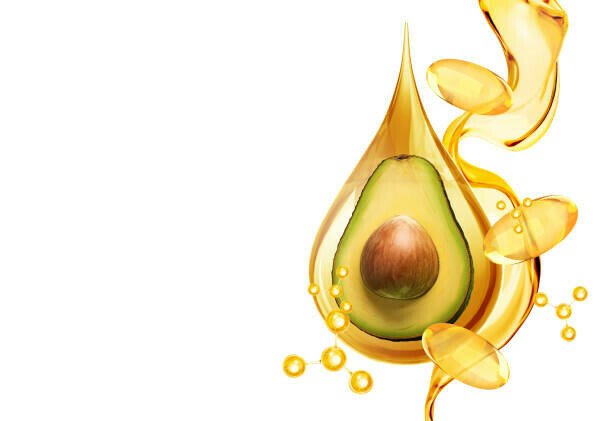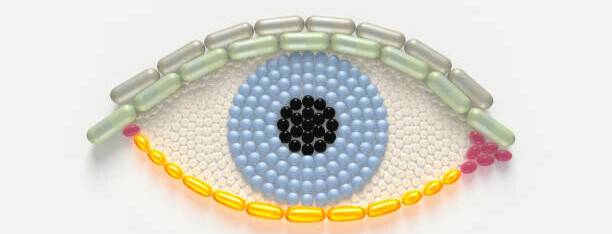Today, I’d like to talk to you about “Lutein Structure” and how it relates to overall health specially eye health. Lutein, the “eye vitamin,” is a vital carotenoid crucial in maintaining and improving human health, especially eye health. Carotenoids in plants are natural pigments that give fruits and vegetables their vibrant colors. Among the various carotenoids, lutein is remarkable for its benefits, particularly for the eyes.
But what is lutein exactly? Structurally, lutein is a type of xanthophyll, a subgroup of carotenoids that contain oxygen and are recognized for their antioxidant properties. This unique structure enables lutein to effectively counteract free radicals, thus safeguarding cells from oxidative stress and harm. Unlike some other nutrients the body can produce, lutein must be obtained through diet, making it an essential part of our daily intake.
Lutein’s role in human health extends beyond its antioxidant abilities. It is notable for its capacity to aid eye health by filtering harmful high-energy blue light and safeguarding the retina from damage. This role is crucial in preventing age-related macular degeneration (AMD), a primary cause of vision loss. Additionally, lutein has been discovered to enhance visual acuity and improve overall eye function, making it a crucial nutrient for individuals aiming to maintain healthy vision throughout their lives.
However, lutein’s advantages go beyond eye health. Recent research suggests that lutein positively impacts cognitive function, reduces the risk of certain chronic diseases, and helps promote healthier skin by providing protection against UV rays damage. Therefore, incorporating lutein into your diet can offer various health benefits that extend well beyond the eyes alone.

You can find plenty of lutein in leafy green vegetables like spinach, kale, and collard greens when it comes to dietary sources. It is also found in other vegetables like corn, peas, and broccoli, as well as in eggs, which provide a highly absorbable form of lutein. Make sure to incorporate these lutein-rich foods into your diet to guarantee an adequate amount of this vital nutrient to promote your overall health and well-being.
Lutein is more than just a typical nutrient; it is an essential element of a well-rounded diet that substantially influences overall health, particularly in protecting the eyes from the consequences of aging and environmental factors. Ensuring sufficient lutein intake is a straightforward yet effective way to invest in your long-term health.
Chemical Structure and Properties of Lutein

Lutein, an essential carotenoid, possesses an intriguing chemical structure that distinguishes it from other nutrients in its category. Its molecular arrangement consists of a sequence of double bonds, creating a lengthy chain containing multiple conjugated double bonds and hydroxyl groups at each end. This distinctive structure gives lutein its bright yellow color and forms the basis of its exceptional antioxidant properties. The presence of these hydroxyl groups enables lutein to effectively interact with free radicals, neutralizing them before they can cause damage to cells through oxidation.
One of the most fascinating aspects of lutein’s molecular structure is its ability to exist in free and esterified forms. In its free form, lutein can be more easily absorbed by the body, enhancing its bioavailability and enabling it to carry out its protective functions more effectively. When esterified, lutein becomes bound to fatty acids, increasing its stability but requiring enzymatic action to convert it into active form. This dual capacity ensures that lutein can be stored in the body and used as needed, providing ongoing defense against oxidative stress.
The physical and chemical properties of lutein further underscore its unique role among carotenoids. Lutein is a compound soluble in lipids and commonly found in the fatty membranes of the retina. It serves an essential function in safeguarding the eyes from high-energy light. This solubility also dictates how lutein is absorbed and transported within the body, necessitating the presence of dietary fats to optimize its absorption from food sources.

Compared to other carotenoids, such as beta-carotene and zeaxanthin, lutein shares certain similarities but also possesses distinct characteristics. Like beta-carotene, lutein possesses antioxidant properties but does not convert into vitamin A, unlike beta-carotene. This lack of conversion allows lutein to focus exclusively on its protective functions without being diverted into other metabolic pathways. Zeaxanthin, a close relative, shares lutein’s preference for the eyes, particularly the macula, where both are concentrated to shield against damage from blue light. However, lutein is more abundant in the peripheral retina, indicating its broader protective scope within the eye.
In summary, lutein’s detailed chemical structure and properties illustrate why it is so effective in promoting health, especially eye health. Its unique molecular configuration, in conjunction with its physical and chemical attributes, makes lutein a potent antioxidant and an essential component of a healthy diet, distinguishing it among carotenoids for its specialized functions and unparalleled benefits.
Biological Functions and Mechanisms of Lutein

Lutein, a potent antioxidant, is a defender of cellular health, offering crucial defense against the damaging effects of oxidative stress. By neutralizing free radicals, lutein prevents cellular harm that can result in long-term illnesses and aging. Its antioxidant characteristics are firm in the eyes and vital in preserving eyesight. Lutein builds up in the retina, particularly in the macula, creating what is commonly known as the “macular pigment.” This pigment acts as a natural barrier, screening out high-energy blue light and lowering the risk of age-related macular degeneration (AMD), a significant cause of vision loss in the elderly. By absorbing blue light, lutein protects photoreceptor cells from harm, ensuring our vision stays sharp and clear.
Lutein’s impact extends beyond safeguarding the eyes. At the cellular level, it is incorporated into cell membranes, stabilizing them and improving their ability to withstand external pressures. This integration allows lutein to maintain cellular integrity, particularly in tissues exposed to high levels of oxidative stress, such as the skin and the brain. In the brain, lutein is linked to cognitive health, with research indicating that higher lutein levels are associated with enhanced cognitive function, memory, and processing speed in adults. This suggests that lutein may help preserve mental agility as we age, making it a crucial nutrient for brain health.
The mechanisms underlying lutein’s impact are varied. In addition to its role as an antioxidant, lutein also regulates inflammation, another critical element in chronic illnesses and aging. By reducing the activity of pro-inflammatory cytokines, lutein helps sustain a balanced immune response, reducing the risk of persistent inflammation that can harm tissues over time. This anti-inflammatory effect and its antioxidant abilities make lutein an essential nutrient for overall cellular health.

Furthermore, lutein’s influence on brain health and cognitive function is increasingly considered essential. Because of its high metabolic activity, the brain is particularly vulnerable to oxidative stress. Lutein, with its antioxidant properties, plays a role in protecting neurons from damage. Additionally, lutein has been shown to improve neural efficiency, enhancing communication between brain cells and supporting cognitive activities such as learning and memory. This positions lutein as a safeguard for eyesight and a significant contributor to maintaining mental sharpness throughout life.
Incorporating lutein into your diet is a straightforward yet effective way to promote eye and brain health. As ongoing research reveals lutein’s diverse roles, its significance in promoting long-term well-being becomes increasingly apparent, underscoring its vital role as a component of a healthy lifestyle.
Lutein in Nutrition and Supplementation
Lutein, a powerful nutrient with numerous health advantages, can be naturally found in various fruits and vegetables, so it’s accessible through a balanced diet. Vegetables such as spinach, kale, and collard greens are some of the most abundant sources of lutein, providing this critical carotenoid in large amounts. Apart from greens, lutein can also be found in vibrant vegetables like corn, peas, and carrots and in fruits such as oranges and kiwis. Even eggs, especially the yolks, are whole of lutein, providing a highly absorbable form that the body can readily take. Including these foods in your daily meals is a simple way to ensure you’re receiving a healthy dose of lutein, which benefits your eyes and overall health.
Supplementation provides a convenient option for those who want to maximize their lutein consumption or may not consume enough lutein-rich foods. Lutein supplements are widely available and can be beneficial in supplementing your diet to ensure you obtain all of the advantages this nutrient provides. Health professionals typically recommend a daily consumption of around 10 milligrams of lutein, which can be acquired from a balanced combination of foods rich in lutein and dietary supplements. However, the optimal dosage may differ based on individual requirements, so it’s advisable to consult a healthcare professional to determine the appropriate amount.
The advantages of lutein supplementation are well-documented and go beyond eye health. Lutein is best known for protecting the eyes from age-related conditions like macular degeneration. Studies have suggested that it promotes cognitive function, skin health and minimizes the risk of chronic diseases linked to oxidative stress. Regularly taking lutein supplements can provide your body with a steady source of this powerful antioxidant, which protects your cells from damage.

Research has also provided insights into the bioavailability and absorption of lutein, which are crucial factors in how effectively it can benefit your health. Lutein is soluble in fat, which is best absorbed with dietary fats. This is one of the reasons why eggs, with their natural fat content, are such an efficient source of lutein. Research has shown that taking lutein with a small quantity of beneficial fat, like olive oil or avocado, can notably improve absorption. Additionally, the form of lutein in supplements can impact bioavailability, with esterified forms needing conversion in the body, while free-form lutein is readily absorbed.
In conclusion, ensuring sufficient lutein intake, whether through diet or supplementation, is a proactive measure to support vision, cognitive function, and overall health. By understanding the sources, benefits, and best practices for lutein absorption, you can make informed choices contributing to your long-term wellness.
Current Research and Future Directions in Lutein Studies

Lutein’s contribution to eye health has been well-recognized for a long time. However, recent research has exposed a more comprehensive range of advantages beyond just vision. Current studies are shedding light on lutein’s potential to impact various health outcomes, making it the subject of intense scientific interest. Recent research has emphasized lutein’s beneficial effects on cognitive function. Research findings indicate a correlation between higher levels of lutein in the brain and improved memory, processing speed, and overall cognitive performance, especially in older adults. Lutein has garnered increasing attention as a possible nutrient for preserving mental sharpness and lessening the chances of age-related cognitive impairment.
Cutting-edge research is also examining lutein’s role in cardiovascular health. The available information implies that lutein could reduce the likelihood of heart disease by addressing oxidative stress and inflammation, essential factors in cardiovascular problems. Furthermore, studies are investigating lutein’s influence on skin health, especially its ability to shield against UV-induced damage and maintain skin elasticity. These discoveries broaden our comprehension of lutein’s role in overall health, positioning it as a multi-functional nutrient with extensive benefits.

Research is set to delve even deeper into lutein’s potential. Scientists are particularly interested in its role in neuroprotection and exploring how lutein might protect against neurodegenerative diseases such as Alzheimer’s. There is also growing interest in the use of lutein in prenatal nutrition, with studies examining how lutein intake during pregnancy might impact fetal brain development and long-term cognitive outcomes for children. These emerging trends suggest that lutein could become a key focus in nutritional science and public health.
The future of lutein research holds exciting prospects, including developing new, more effective forms of lutein supplementation that maximize bioavailability and absorption. Advances in food technology may also lead to fortifying common foods with lutein, making it easier for people to incorporate this essential nutrient into their diets.
Public health recommendations are beginning to reflect these findings, with experts advocating for increased lutein intake as part of a balanced diet. Given lutein’s broad range of benefits, we will see more public health initiatives promoting lutein-rich foods and supplements to help combat the growing burden of age-related diseases and support long-term health.
In conclusion, the research on lutein is rapidly evolving, uncovering new benefits and potential applications that could have significant implications for public health. As our understanding of this remarkable nutrient grows, lutein may become a cornerstone of health and wellness strategies for people of all ages.
Thank you for reading my article about “Lutein Structure” and its relation to healthy eyes and overall wellness and I would love to receive your comments down below, in case of any.


